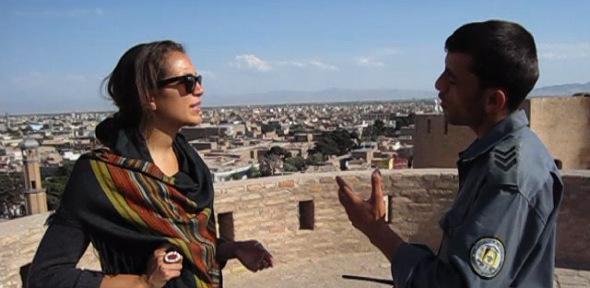
Alumna Sarah Cunningham studied Engineering here at Cambridge from 2003 - 2007, below she tells her story from graduation to working for the United Nations.
Strange smells, foreign sounds, scorching desert temperatures and the general chaos that generalises Middle Eastern life have now become my world. A world that is full of endless challenges and saddening stories, but a world that has also given me the most happiness, satisfaction and pure drive that we all strive for in work and life. As an Engineering graduate from Cambridge University, I am often faced with the question, 'so how did you end up in development?' The path I have chosen, of course has not been a conventional one for an Engineer but I often try to explain to people that actually Engineering and Development work have remarkable similarities. Both are about problem solving. Both are about trying to improve the world in a small or in some cases, large way. Both Engineers and Development Workers are required to have a sharp mind, think outside the box, work long, hard hours and put passion into their products. They are not so different.
The day after I graduated in 2007, I found myself on a plane flying to Jordan, also known as the country that is between I-raq and a hard place. My career in aid and development started with an internship where I was thrown in at the deep end, trying to decipher all of the jargon and endless acronyms that come with any new field. Development projects by design have to be as cost effective as possible to ensure that the maximum amount can be spent on your beneficiaries and not on supporting a large administrative and management structure. Therefore, even as an intern I was tasked immediately with managing an emergency programme that delivered aid to internally displaced Iraqis in southern Iraq. It was all hands on deck.
My next adventure took me to the Kurdish region of Iraq. Here I was in charge of creating an NGO www.ace-iraq.org that serves Iraqis returning to Iraq from Europe, assisting them with finding employment by providing training and job placement opportunities. Managing a team of Iraqis was a great experience. Like any form of management it was important to understand the motivations behind my employees. In the case of my Iraqi colleagues, we became good friends. Although there were tough times, late nights, difficult decisions and feelings of hopelessness and failure, there came the good times with the success stories of our beneficiaries who finally managed to find work because of our interventions and could feed their families and send their children to school. These were the times which made it all worth it.
Having spent almost three years in the Arabic speaking world between Jordan and Iraq, but with many trips to the surrounding countries including Yemen, Oman, Syria, Lebanon, Palestine and Egypt I felt I needed a change, a new challenge. As young people, we have a lot of energy, new ideas and motivation. We also have this urge to keep learning and developing ourselves. My urge led me to one of the biggest challenges I have faced in my life. Afghanistan.
I started my time in Afghanistan doing research for a range of different entities through a small but dynamic company called Altai Consulting. Despite almost a decade of aid support, the situation is still desperate for millions of Afghans. There is continuing military action within a country that has complex tribal and social structures. Everyone, therefore trying to understand the situation better before intervening. That is where the research comes into play. My research ranged from studies of the business and investment climate for the World Bank to analysing the health sector and its ability to provide maternal care to expecting mothers for the United Nations. My research allowed me to travel extensively across Afghanistan, which in the current climate is quite a rarity. I have been lucky enough to travel North, West, East and South through careful choices and a low-profile approach. Since arriving I have learnt Dari, which is almost essential as no one outside of the cities speak a word of English. Speaking someone's language also allows you to connect in a way that is not possible through a translator, which has been essential for good research. Without a doubt, the analytical skills I learnt during my degree have proved invaluable to being an effective researcher.
I have recently started working for the United Nations, which in many ways has been a dream come true. But what I am happiest about is that the road getting here, although a bumpy one at times, has been a fascinating one that has allowed me to develop myself personally and professionally and I have really ended up doing something I love.
The biggest thing that Cambridge taught me and in particular a tough course like Engineering, is that anything is possible. We were trained to find solutions to problems, and that is something we can translate into any field of work. The key is to be brave, take risks and follow your dreams, whatever they may be.

